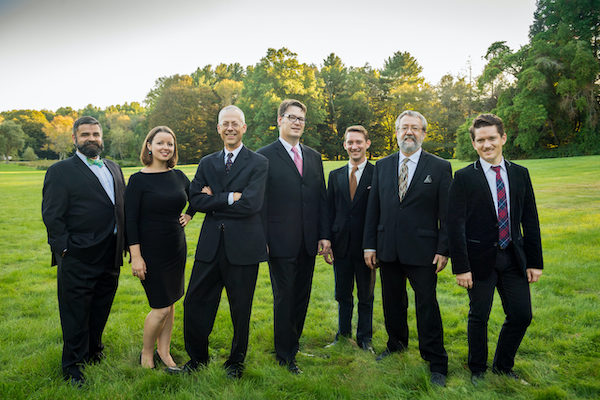Blue Heron celebrates Ockeghem’s 600th and a love divine
Like its concert-presenting peers around the city, Music Before 1800 at Corpus Christi Church has managed a masked-and-vaccinated comeback this season. And it wouldn’t seem like a season at the early-music series in Morningside Heights without a visit from the superb Boston-based vocal group Blue Heron, which arrived in time to give the season’s closing concert Sunday afternoon.
Titled “Divine Songs,” the pandemic-configured program—lasting a little over an hour, with no intermission—was devoted mainly to the early-Renaissance Flemish master Johannes Ockeghem, a composer who, like Beethoven, suffered a birthday-party postponement in 2020. Concerts honoring Beethoven’s 250th birth anniversary are now belatedly underway, and so, in a more modest way, are observations of Ockeghem’s 600th.
The only work on Sunday’s program in more than one movement—and an extremely compact work at that—was Ockeghem’s Missa sine nomine a 5 (Untitled Mass for Five Voices), consisting of an epigrammatic Kyrie, a scarcely-longer Gloria, and a Credo with a touch of prolixity in the tenor part. According to a program note by the group’s artistic director Scott Metcalfe, this no-name survivor, missing the last two standard mass movements, nevertheless stands out for its complex workmanship and experimentation with five-voice textures.
Each movement was for five distinct voices, but not always in the same range from one movement to the next, so that, by the time the mass was done, Sunday’s full complement of eight singers had participated: mezzo-sopranos Kim Leeds and Sophie Michaux on the “cantus” part; Corey Dalton Hart, Jason McStoots, Mark Sprinkle, and Sumner Thompson, “tenor” and “contratenor”; and Daniel Fridley and David McFerrin, “bassus.”
The Kyrie was like a piece on fast forward, with harmonic changes and variations stepping on each other in dense counterpoint, and all over in about a minute. The singers could relax a little, but not much, in the roomier sound of the Gloria.
In the Credo, Thompson amusingly conveyed Metcalfe’s detection of medieval humor in Ockeghem’s portrayal of a “bored priest,” droning out the tenor part while his four colleagues swoop and sway around him in gorgeous curlicues, until he wakes up and joins the party in the final bars. Anyway, it was easier than trying to follow the cantus firmus as it jumped through five parts.
Filling out the program, seven songs and motets by Ockeghem and his younger Low Country contemporaries surrounded the mass, some of them religious, some romantic, and some where it was hard to tell the difference.
The program’s first item, Heinrich Isaac’s “O Maria, mater Christi,” performed by the full ensemble, made an ideal ear-opener for that Blue Heron sound: a straight but not austere tone, the crystalline vowels of the text gently tumbling over each other in counterpoint, like bits of colored glass in a kaleidoscope.
A different hymn to Mary by Jacob Obrecht, “Ave, maris stella” (Hail, star of the sea) for three male singers, had a distinctly nautical swing to it, with a sturdy tune in the bass vigorously decorated by the upper voices.
The bitter, cynical text of “Ung aultre l’a, n’en querés plus” (Another has it, seek it no more) would seem to call for energetic singing again, but this so-called “royal rondeau” turned out to be all sweetness and light, musically at least, as mezzo Michaux and tenor Sprinkle wove their voices in mellow thirds and sixths over a gentle contratenor voice in Metcalfe’s harp. What long-ago (royal?) dispute prompted this loser’s lament remained a mystery.
Tenor McStoot and basses McFerrin and Fridley bonded over the girl that got away in a well-acted performance of Ockeghem’s “L’autre d’antan, l’autrier passa” (The other year, the other day, she passed by). The Virgin Mary was definitely not the topic as they shook their heads and sang, “…ever since she did her dance,/The other year, the other year,/I’ve had neither good day nor good year…”
According to Metcalfe, that half-step above the tonic has given the Phrygian mode a sad sound for at least six hundred years—think of Brahms’s Fourth Symphony—and Michaux’s and McStoots’s glowing thirds and unisons only heightened the melancholy in Ockeghem’s Phrygian love song “Ma bouche rit et ma pensée pleure” (My mouth laughs and my thoughts weep). Metcalfe’s fiddle murmured alongside them like a sympathetic friend.
Leeds and Thompson countered with a happier love song, her creamy mezzo intertwining with his eager tenor in Antoine Busnoys’s “Quant j’ay au cueur aulcun contraire” (Whenever my heart is burdened by adversity), while Metcalfe grounded the harmonies with a drone-like part in his harp. Whether this encomium was addressed to a lover or the Blessed Virgin, Busnoys wasn’t saying.
There was no such ambiguity about Ockeghem’s “Salve regina” (Hail queen), in which the full ensemble closed the program by imploring the Virgin to lift the burden of sin “in this vale of tears.” Listeners were discharged into the vale of tears—otherwise known as West 121st Street—with the sound of harmonically rich vocal duets resonating in their minds.







